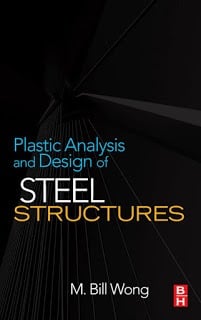
Plastic Analysis and Design of Steel Structures
10 July 2018Plastic Analysis and Design of Steel Structures
The plastic method has been used extensively by engineers for the
design of steel structures, including simple beams, continuous beams,
and simple portal frames. Traditionally, the analysis is based on the
rigid-plastic theory whereby the plastic collapse load is evaluated
through virtual work formulation in which elastic deflection is
ignored. For more complex frames, specialist computer packages for
elastoplastic analysis are usually employed. Current publications on
plastic design method provide means of analysis based on either virtual
work formulation or sophisticated plastic theory contained in
specialist computer packages. This book aims to bridge this gap.
hinge by hinge concept. Frames of any degree of complexity can be
analyzed plastically using this method. This method is based on the
elastoplastic analysis procedure where a linear elastic analysis, performed
either manually or by computers, is used between the formation
of consecutive plastic hinges. The results of the linear elastic
analysis are used in a proforma created in a spreadsheet environment
where the next plastic hinge formation can be predicted automatically
and the corresponding culmulative forces and deflections calculated.
In addition, a successive approximation method is described to take
account of the effect of force interaction on the evaluation of the collapse
load of a structure. This method can be performed using results
from analysis obtained from most commercially available computer
programs.


